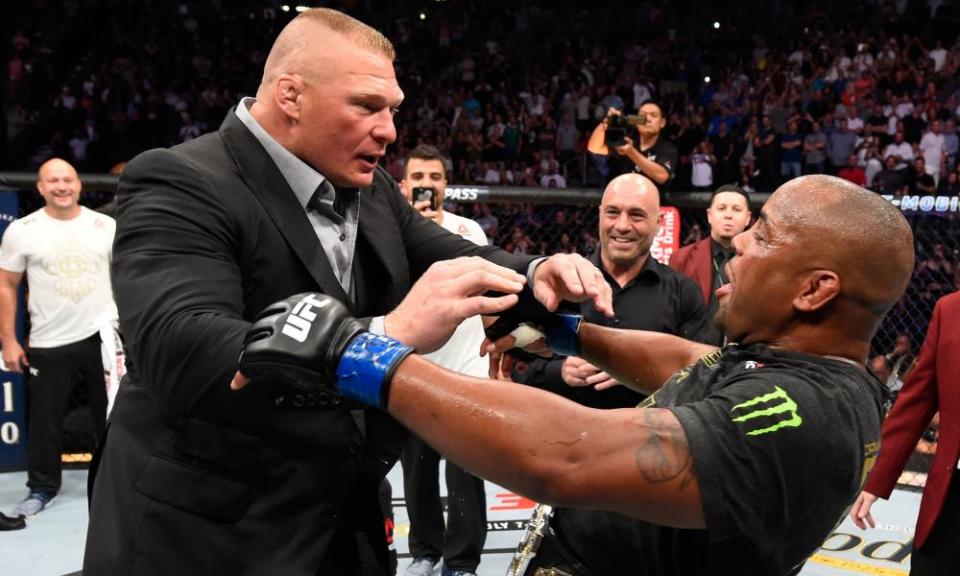Brock Lesnar v Daniel Cormier: a depressing product of UFC's entertainment era
It looks like a 39-year-old may soon fight a 40-year-old for the heavyweight title. It’s hardly a resounding endorsement of the future

Curtis “Razor” Blaydes cut loose after UFC 226’s main event on Saturday night. He had just watched WWE star Brock Lesnar strut into the octagon for the first time in two years, and engage in a shoving match with UFC heavyweight champion Daniel Cormier.
“Tired of all the politics,” Blaydes tweeted. “Like is it even still about fighting? First CM Punk now Brock Lesnar. I’ll just continue to grow as a martial artist and become more dangerous and I refuse to resort to that WWE bs fake arguing just to draw in lame ass casual fans.”
Lesnar’s intervention suggested to many observers that marketability is now as important as fighting ability in UFC. Responding to Blaydes and other mixed martial artists who don’t appreciate melding real fighting with pro-wrestling antics, Cormier offered a simple and telling retort: “Stay broke.”
Fully embracing UFC’s “entertainment era” has meant choosing between manufacturing drama, the seemingly easier option, or playing up the real thing, which may not always exist. Indeed, Lesnar’s introduction on Saturday quickly eroded UFC 226 from a sporting triumph to a debased spectacle. Miocic didn’t have a chance to exit the cage before Lesnar grabbed a microphone and called him a “piece of shit.”
That said, you can’t argue with Lesnar’s ability to generate interest. He has long been in the business of luring in audiences with caustic language, and his ability to engage folks outside the mixed martial arts world is the reason he headlined three UFC pay-per-views, each of which attracted more than one million buys.
Over the last decade the UFC created fights that fans didn’t know they wanted until they were told otherwise. And by leaning on compelling personalities like Lesnar, Conor McGregor, Ronda Rousey and Georges St-Pierre the promotion generated significant pay-per-view revenue.
Times change, of course. Rousey is gone to the WWE. St-Pierre is all but retired. McGregor is expected to fight again this year, though it’s hard to say how often he will appear in the octagon.
This core group largely built themselves and were aided by the UFC media machine. It’s never easy to cultivate and sell big-time fighters to the public. The biggest challenge facing the UFC in recent years has revolved around finding new stars.
Less than a year ago, for example, UFC president Dana White touted Cameroonian heavyweight Francis Ngannou as the future, a potential global star, the heaviest hitter in a constellation of heavy hitters. On Saturday night, less than a year removed from a title challenge defeat to Miocic, White berated Ngannou and his apparently giant ego following a terrible three-round staring contest with another listing heavyweight contender, Derek Lewis.
That’s why it means nothing that Lesnar is 40-year-old and has not officially won a UFC fight since 2010, which is when he relinquished the promotion’s heavyweight title to Cain Velasquez. Or that he is caught up in an ongoing doping controversy following a failure in his last bout two years ago at UFC 200 (which also sold more than a million pay-per-views).
Blaydes (10-1, 1 no contest) is currently taking the less rewarding workmanlike trek to fame and fortune. He plastered veteran Alistair Overeem with a volley of elbows last month, placing him atop a very short list of the heavyweight division’s chief contenders.
That’s why Blaydes, a 27-year-old former junior college champion wrestler, reacted so strongly when Cormier used UFC 226 to call out Lesnar, who was noticeably seated cage-side. In Blaydes’s mind it should have been him, but few know the man and the 39-year-old Cormier appears uninterested in giving some dangerous kid a shot. “I’m at a point now where it’s very difficult to fight a Curtis Blaydes,” said Cormier, who claims he will retire from MMA by the time he turns 40 in March.
By any sporting measure Lesnar should not have been granted a title opportunity. Yet in White’s estimation a contest between Lesnar and Cormier is “a fight people want to see,” which is the most basic and yet the most meaningful measuring stick inside the company. At this stage, UFC fans are conditioned to root for any fight that makes the most money for the company.
“I’m fighting Brock Lesnar,” Cormier said on Saturday. “I’m getting paid. I want to fight fights that make sense.” For a select group of UFC fighters big-money bouts can be a reality. The rest of them are made to wait and tweet.

